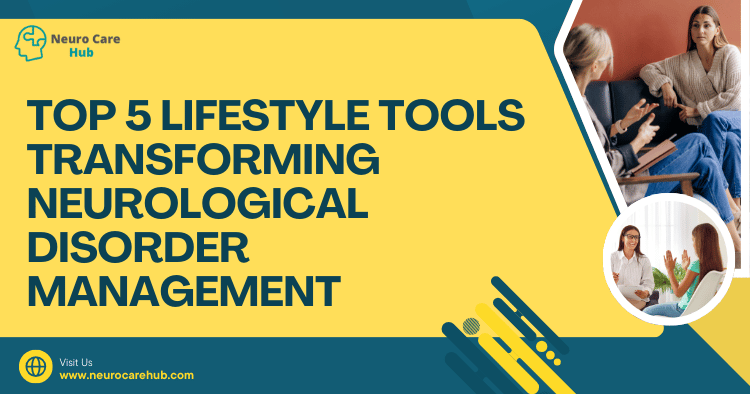Table of Contents
- Introduction
- 1. Wearable Technology
- 2. Mobile Health Apps
- 3. Cognitive Training Programs
- 4. Telehealth Services
- 5. Mindfulness and Stress Management Tools
- Conclusion
- FAQs
Introduction
Managing neurological disorders can often feel like navigating a maze. From tracking symptoms to finding the right treatment options, it can be overwhelming. Thankfully, advancements in lifestyle tools have transformed the landscape of neurological disorder management, making it more accessible and effective. In this article, we’ll explore five remarkable lifestyle tools that are not only changing lives but also empowering patients and caregivers alike.
1. Wearable Technology
Wearable technology has surged in popularity over the last few years, and for good reason. Devices such as smartwatches and fitness trackers help individuals monitor a variety of health metrics, from heart rate to sleep quality. These tools are particularly beneficial for people with neurological disorders, as they can provide real-time data that healthcare providers can use to tailor treatment plans.
Key Features
- Activity Tracking: Monitor daily physical activity and set fitness goals.
- Heart Rate Monitoring: Track cardiovascular health, which is crucial for many neurological conditions.
- Sleep Analysis: Understand sleep patterns and make necessary adjustments to improve rest.
Example: The Apple Watch offers features that can detect falls, which is particularly useful for individuals with conditions like epilepsy or Parkinson’s disease.
Benefits:
- Increases patient engagement in their own health.
- Provides valuable data that can enhance telehealth consultations.
- Encourages physical activity, which is essential for neurological health.
For more insights on the integration of technology in neuro care, check out Top 5 Essential Tools in Neuro Care You Should Know.
2. Mobile Health Apps
Mobile health (mHealth) apps have revolutionized how individuals manage their health. These applications can help track symptoms, medication schedules, and even mood changes. The convenience of having this information at your fingertips empowers users and promotes proactive health management.
Popular Apps
| App Name | Functionality | Platform |
|---|---|---|
| MyTherapy | Medication reminders and symptom tracking | iOS, Android |
| Headspace | Mindfulness and meditation practices | iOS, Android |
| Neurotrack | Cognitive training specifically for neurological health | iOS, Android |
Benefits:
- Simplifies medication management, reducing the risk of missed doses.
- Provides insights into symptom triggers, leading to more informed discussions with healthcare providers.
- Encourages mindfulness practices that can help reduce anxiety and improve overall well-being.
For a deeper look, explore Top 5 Reasons Neuro Care is Essential in Modern Medicine.
3. Cognitive Training Programs
Cognitive training programs have gained traction in recent years, particularly for individuals dealing with cognitive impairments due to neurological disorders. These programs are designed to enhance cognitive functions such as memory, attention, and problem-solving skills.
Notable Platforms
- Lumosity: Offers a variety of games aimed at improving cognitive skills.
- CogniFit: Provides personalized training programs based on individual assessment.
Benefits:
- Engages users in stimulating activities that can potentially slow cognitive decline.
- Encourages regular mental exercise, similar to physical workouts.
- Offers progress tracking to motivate users.
Research suggests that consistent use of cognitive training programs can lead to improvements in cognitive function. For more insights, visit Top 5 Cognitive Training Exercises to Boost Brain Health.
4. Telehealth Services
Telehealth services have transformed the way patients access healthcare, especially for those living with neurological disorders. With the ability to consult healthcare providers via video calls, individuals can receive care without the stress of traveling or waiting in clinics.
Key Advantages
- Convenience: Receive care from the comfort of home, reducing travel time and expenses.
- Access to Specialists: Consult with neurologists and mental health professionals who may not be locally available.
- Regular Check-ins: Easier to schedule follow-ups and check-ins to monitor progress.
As highlighted by the American Telemedicine Association, telehealth has improved patient outcomes and satisfaction significantly, especially for chronic conditions. This is also emphasized in Top 5 Ways Primary Physicians Enhance Neuro Care.
5. Mindfulness and Stress Management Tools
Mindfulness and stress management techniques are invaluable for individuals dealing with neurological disorders. Stress can exacerbate symptoms, making it essential to incorporate calming practices into daily routines.
Effective Tools
- Meditation Apps: Apps like Calm and Insight Timer offer guided meditations tailored for stress relief.
- Breathing Exercises: Tools like Breathe2Relax help users practice deep breathing techniques to reduce anxiety.
Benefits:
- Enhances emotional well-being, which can improve overall health outcomes.
- Provides coping strategies for managing stress and anxiety related to neurological disorders.
- Encourages a healthier lifestyle through mindfulness practices.
For more tips on stress management, visit Top 5 Ways Caregivers Enhance Neuro Care Effectiveness.
Conclusion
Innovative lifestyle tools are changing the way we approach neurological disorder management. From wearable technology to cognitive training programs, these resources empower patients and enhance the quality of care they receive. By integrating these tools into daily life, individuals can take control of their health and improve their overall well-being.
FAQs
Q: How do I choose the right wearable device for my needs?
A: Consider what features are most important to you—like heart rate monitoring or fall detection—and consult with your healthcare provider for recommendations.
Q: Are mobile health apps secure?
A: Reputable apps prioritize user privacy and data security. Always read privacy policies and user reviews before downloading.
Q: Can cognitive training really improve memory?
A: While results vary by individual, many studies suggest that cognitive training can lead to improvements in specific cognitive skills.
Q: Is telehealth covered by insurance?
A: Many insurance plans cover telehealth services, but coverage can vary. Check with your provider for specific details.
Q: How often should I practice mindfulness?
A: Consistency is key—aim for at least a few minutes each day and gradually increase your practice as you become more comfortable.
By embracing these lifestyle tools, individuals with neurological disorders can take proactive steps towards better health management, paving the way for a more fulfilling life. For more insights on neuro care, visit Neuro Care: A Guide to Brain Health.






